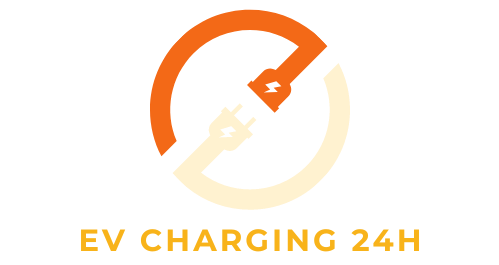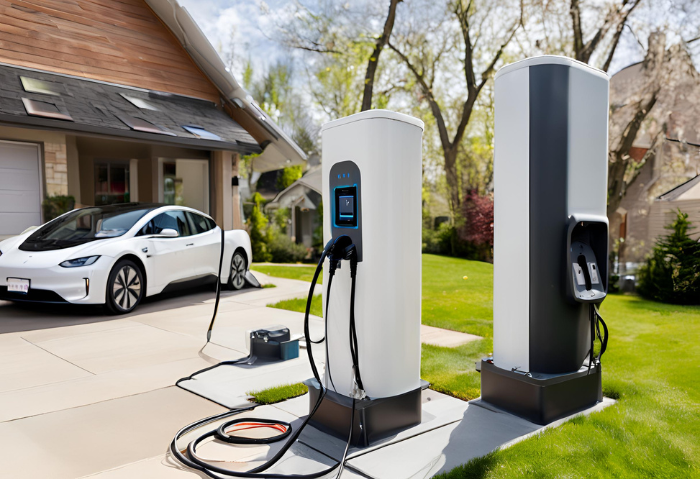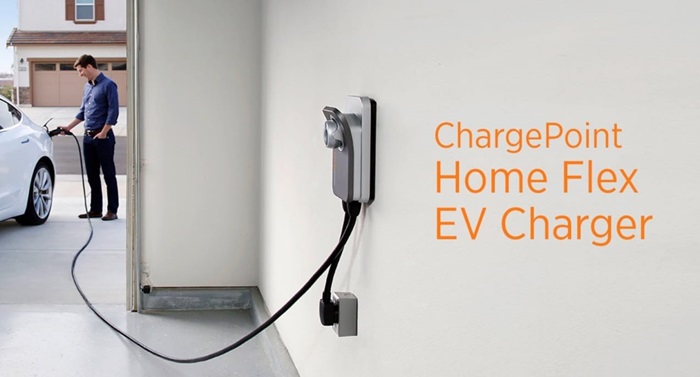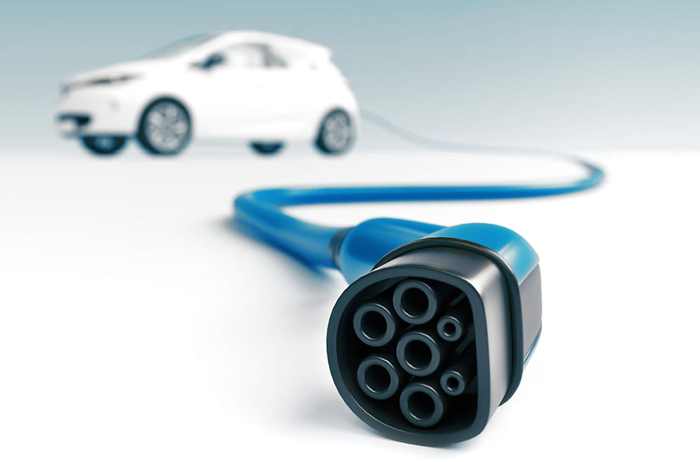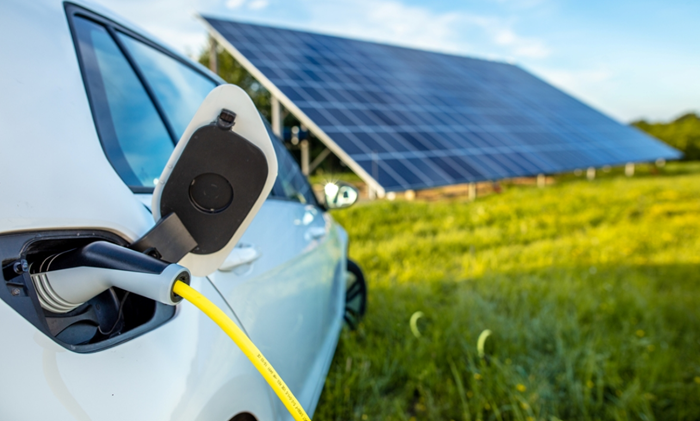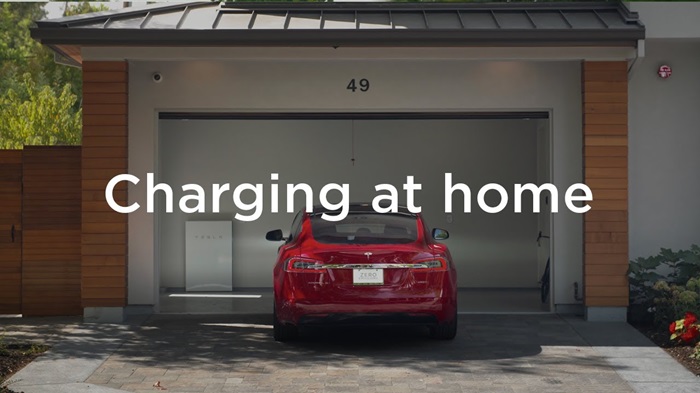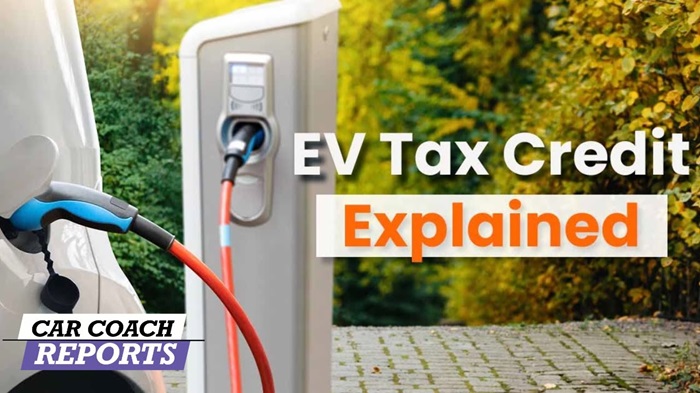EV Fast Chargers: Powering the Future of Electric Mobility
EV fast chargers are revolutionizing the electric vehicle landscape, offering a convenient and efficient way to replenish battery power. These high-powered stations can significantly reduce charging times compared to traditional chargers, making long-distance travel more feasible and appealing for EV drivers.
With advancements in technology and infrastructure, EV fast chargers are poised to play a crucial role in accelerating the widespread adoption of electric vehicles, contributing to a more sustainable future for transportation.

EV Fast Charger Explained
An EV fast charger, also known as a DC fast charger or Level 3 charger, is a type of charging station that can replenish the battery of an electric vehicle (EV) much faster than a traditional Level 1 or Level 2 charger. They typically deliver direct current (DC) power at high voltages, significantly reducing charging times from hours to minutes.
Types of EV Fast Chargers
Types of EV fast chargers can vary based on their power output and connector types. Common types include:
- DC Fast Chargers: These chargers supply direct current (DC) to the vehicle’s battery, bypassing the vehicle’s onboard charger. They are typically more powerful and can charge EVs much faster than AC chargers.
- Level 3 Chargers: Level 3 chargers are another term for DC fast chargers. They are typically found in public charging stations and are capable of providing very high power levels, enabling rapid charging.
- CHAdeMO Chargers: A type of DC fast charger that uses the CHAdeMO standard connector. It was created by Japanese businesses and is frequently found in electric Nissan and Mitsubishi cars.
- CCS Chargers: CCS (Combined Charging System) is another type of DC fast charger that has become increasingly popular, especially in Europe and North America. Many automakers support it, and it integrates both AC and DC charging into a single connector.
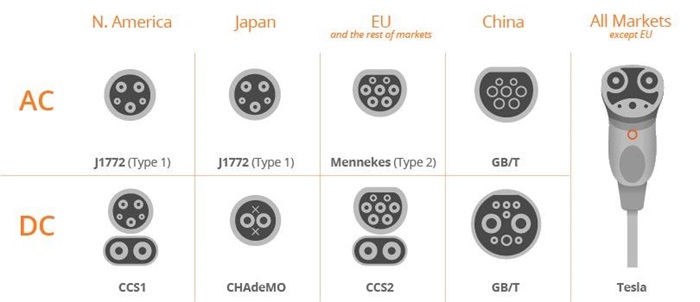
The advantages of using an EV fast charger include:
Faster Charging: EV fast chargers can significantly reduce charging times compared to standard chargers, making them ideal for long-distance travel or quick top-ups during the day.
Convenience: With fast chargers becoming more widespread, EV owners have greater flexibility in their charging routines, allowing them to recharge quickly while on the go.
Extended Range: Rapid charging enables EV drivers to cover longer distances without worrying about running out of battery power, increasing the practicality of electric vehicles for various applications.
Infrastructure Development: The deployment of fast chargers contributes to the expansion of EV charging infrastructure, encouraging more people to adopt electric vehicles and reducing reliance on fossil fuels.
How does an EV fast charger work?
EV fast chargers provide DC power directly, unlike Level 1 and Level 2 chargers that deliver AC (alternating current) power that must be converted to DC (direct current) by the car’s onboard charger before the battery can use it.
Here’s a step-by-step explanation of how a DC fast charger works:
- Plug In: You pull your EV up to the charging station and connect the DC fast charger cable to the charging port on your vehicle.
- Safety Check: The charger and your car communicate with each other to ensure a safe connection and determine the appropriate charging rate based on your car’s battery health and capabilities.
- DC Power Delivery: The DC fast charger delivers high-voltage DC power directly to the battery pack, bypassing the car’s onboard charger.
- Battery Management System (BMS) Takes Control: The car’s BMS (battery management system) regulates the charging process, monitoring factors like battery temperature and current to optimize charging and prevent damage.
- Charging Complete: Once the battery reaches the desired level of charge, the charging session is terminated.
importance of EV Fast Chargers in the transition to electric vehicles
A linguistic theory called frame semantics focuses on how a word’s meaning changes depending on the context in which it is used. In the context of your topics, frame semantics helps us understand the significance, challenges, and solutions related to EV fast chargers and the transition to electric vehicles (EVs).
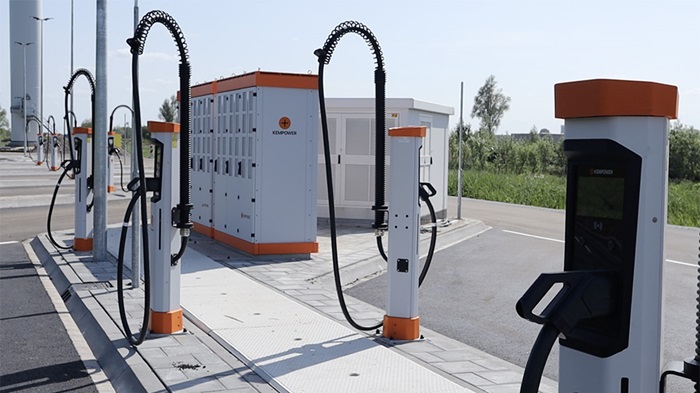
EV fast chargers play a crucial role in accelerating the adoption of electric vehicles. They address one of the primary concerns of potential EV buyers: range anxiety. Fast chargers enable drivers to recharge their EVs quickly, making long-distance travel more feasible and convenient.
This accessibility encourages more people to switch to electric vehicles, contributing to the reduction of greenhouse gas emissions and dependence on fossil fuels.
Government Support for Fast Charger Infrastructure
Governments around the world recognize the importance of EV fast chargers and are implementing initiatives to promote their installation.
- Subsidies and Grants: Financial incentives are offered to businesses and municipalities to offset the cost of installing fast charging stations.
- Tax Breaks: Tax breaks can be provided to companies that invest in EV charging infrastructure, making it a more financially attractive proposition.
- Streamlined Permitting Processes: Governments can streamline the permitting process for installing fast chargers, reducing bureaucratic hurdles and speeding up deployment.
- Investment in Public Charging Networks: Direct government investment can be used to create a network of fast chargers in strategic locations, ensuring widespread accessibility.
Challenges and Solutions for Charging Infrastructure
Despite the growing importance of EV fast chargers, there are still challenges to overcome:
- Grid Capacity: The widespread adoption of EVs could strain the capacity of the electricity grid, especially during peak hours. Upgrading and expanding the grid is crucial to supporting the increased demand for electricity.
- Cost of Installation: Installing fast chargers is expensive, and the upfront cost can deter businesses and municipalities from participating. Government incentives and cost-sharing programs can help bridge this gap.
- Standardization: A lack of standardization in charging connectors can create confusion for drivers. Universal standards will ensure compatibility and improve the user experience.
Here are some solutions that can address these challenges:
- Smart Charging Technology: Smart charging technology can optimize charging times and distribute the load on the grid more efficiently.
- Renewable Energy Integration: Integrating renewable energy sources like solar and wind power into the grid can help ensure a clean and sustainable source of electricity for EVs.
- Public-Private Partnerships: Collaboration between governments and the private sector can accelerate the rollout of fast charging infrastructure and share the financial burden.
The Future of EV Fast Charging Technology
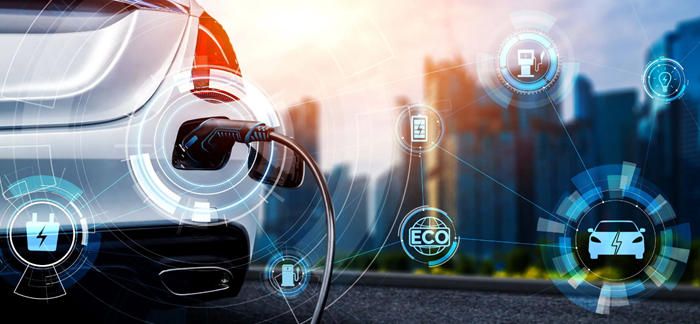
The future of EV fast-charging technology is bright and constantly evolving. Here are some trends to watch:
- Ultra-Fast Charging: The next generation of fast chargers will offer even faster charging speeds, potentially reducing charging times to as little as 10–15 minutes.
- Wireless Charging: Wireless charging technology is being developed that would eliminate the need for cables altogether, offering a more convenient charging experience.
- Battery Technology Advancements: Improvements in battery technology are expected to increase the range of EVs and reduce charging times even further.
- Bidirectional Charging: Future EVs might be able to utilize bi-directional charging, allowing them to feed power back into the grid during peak demand periods.
EV Fast Charger Glossary
Lexical semantics deals with the study of word meanings and relationships between words in a language. In the context of your topics, let’s explore a glossary of common terms related to EV fast chargers, compare them with conventional charging methods, examine their impact on energy consumption, and discuss their compatibility with different EV models.
- Glossary of Common Terms Related to EV Fast Chargers:
An electric car, or EV for short, is one that runs on electricity that is stored in rechargeable batteries or other energy-storage technologies.
Fast Charger: A charging station that can rapidly recharge an electric vehicle’s battery, typically providing high-power charging to reduce charging time.
kW (Kilowatt): A unit of power, often used to measure the charging rate of EV fast chargers.
kWh (kilowatt-hour): A unit of energy, representing the amount of energy consumed or stored over time, commonly used to measure the capacity and consumption of EV batteries.
CHAdeMO: High-power DC charging through a commonly used fast charging protocol by Japanese electric car producers.
Many American and European EV manufacturers use the CCS (Combined Charging System) fast charging standard, which combines AC and DC charging capabilities in a single connector.
The Tesla Supercharger is a type of fast charging station that is exclusive to Tesla Motors and is designed to provide high-speed charging for their electric vehicles.
Plug Type: Refers to the physical connector used to connect an electric vehicle to a charging station, with various standards such as Type 1, Type 2, CCS, CHAdeMO, and Tesla.
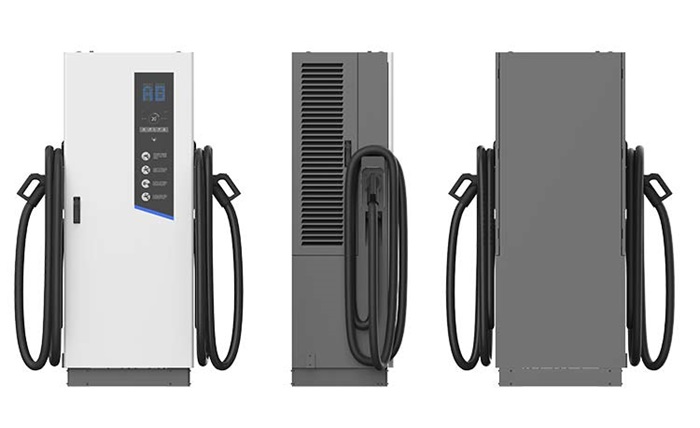
- Comparison between EV Fast Chargers and Conventional Charging Methods:
| Feature | EV Fast Charger | Level 2 Charger | Level 1 Charger |
| Charging Speed | Fastest (minutes) | Faster (hours) | Slowest (overnight) |
| Power Output | High DC power | AC power | AC power (low) |
| Ideal Use | Long trips, top-ups | Public charging, workplaces | Home charging |
| Cost per kWh | Typically higher | Varies | Typically lower |
| Availability | Increasing but less common than Level 2 | More common than fast chargers | Widely available |
- Impact of EV Fast Chargers on Energy Consumption:
The impact of EV fast chargers on energy consumption is twofold:
Increased Demand: Widespread adoption of EVs and fast chargers will undoubtedly lead to an increase in overall electricity demand. However, the following can help mitigate this:
- Shifting Charging Times: Encouraging off-peak charging during night hours can help reduce strain on the grid during peak usage periods.
- Integration of Renewables: Investing in renewable energy sources like solar and wind can provide a clean and sustainable source of electricity to power EVs.
Improved Efficiency: EVs are inherently more efficient than gasoline-powered vehicles. Even with the additional energy required for fast charging, EVs are still expected to have a lower overall carbon footprint.
- Compatibility of EV Fast Chargers with Different EV Models:
EV fast chargers are designed to be compatible with various EV models, but compatibility may vary depending on factors such as plug type, charging protocol, and power output.
Most fast chargers support multiple plug types and charging standards, such as CCS, CHAdeMO, and Tesla Supercharger connectors.
However, some EV models may require adapters to use certain types of fast chargers, especially when traveling in regions with different charging standards.
Manufacturers and charging network operators often provide information on charger compatibility to help EV drivers plan their charging sessions effectively.
Leading manufacturers of EV Fast Chargers
Topical authority refers to the expertise and credibility a source possesses in a specific subject area. In the realm of EV fast chargers, understanding the leading manufacturers, regulatory standards, successful installations, and ongoing research and development is crucial to establishing topical authority.
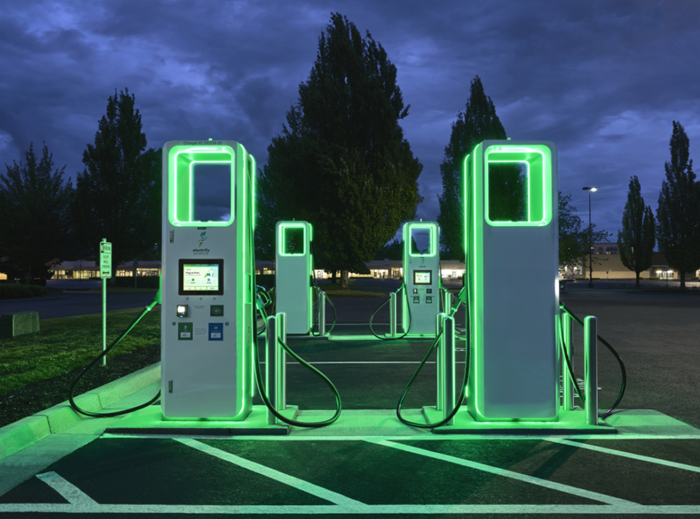
- Leading manufacturers of EV fast chargers:
ABB is a global leader in EV charging infrastructure, offering a range of fast chargers for both public and private applications.
Siemens: Known for its innovative charging solutions, Siemens provides fast chargers with advanced features for efficient and reliable charging.
ChargePoint is a prominent provider of EV charging networks, offering fast charging solutions for businesses, fleets, and public spaces.
EVBox is a leading manufacturer of EV charging stations, including fast chargers, with a focus on sustainability and smart charging technology.
Delta Electronics specializes in high-power fast chargers for commercial and industrial applications and is known for their reliability and performance.
- Regulatory Standards and Certifications for EV Fast Chargers:
CHAdeMO: The fast charging protocol created by the CHAdeMO Association, which is widely utilized by electric vehicle (EV) manufacturers in Japan. Certification guarantees both safety and interoperability.
Many American and European EV manufacturers have adopted the CCS (Combined Charging System) standard charging protocol, which is certified to ensure compatibility and adherence to industry standards.
UL Certification: To guarantee that EV charging equipment complies with electrical safety regulations, Underwriters Laboratories (UL) issues safety certifications.
CE Marking: Required for EV fast chargers sold in the European Economic Area, indicating compliance with EU safety, health, and environmental protection standards.
ISO Standards: The International Organization for Standardization (ISO) establishes technical standards for EV charging infrastructure, promoting interoperability and safety.
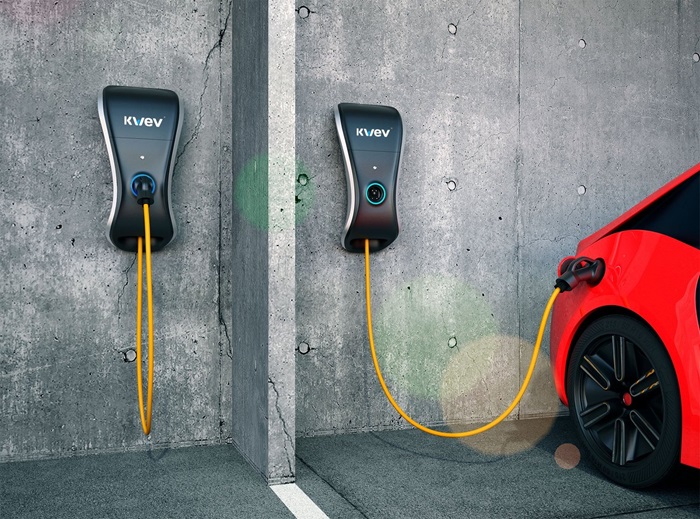
- Case Studies of Successful EV Fast Charger Installations:
Electrify America: Deployed a network of fast chargers across the United States, supporting long-distance travel and promoting EV adoption.
IONITY: Established a pan-European network of high-power charging stations along major highways, enabling fast and convenient charging for electric vehicles.
EVgo operates a network of fast chargers in the United States, focusing on urban areas and key transportation corridors to support EV drivers.
Oslo, Norway: Implemented a successful EV charging infrastructure strategy, including fast chargers, to support the widespread adoption of electric vehicles in the city.
Tesla Supercharger Network: Tesla’s proprietary network of fast chargers enables long-distance travel for Tesla owners, with strategically located stations worldwide.
- Research and Development in the Field of EV Fast Chargers:
Ongoing research aims to improve the efficiency, reliability, and affordability of EV fast chargers. Focus areas include advancements in battery technology to support faster charging rates, the development of smart charging algorithms for optimized energy management, and the integration of renewable energy sources into charging infrastructure.
Collaborations between academia, industry, and government entities drive innovation in EV charging technology, with initiatives aimed at reducing charging times, increasing charging station availability, and enhancing the user experience.
These advancements hold immense promise for the future of EV fast charging, making EVs an even more attractive and practical choice for consumers.

Henry Michael is a leading expert in EV charging station research, specializing in innovative solutions for electric vehicle infrastructure. With a passion for sustainability and technological advancement, he is dedicated to advancing the accessibility and efficiency of EV charging worldwide.
